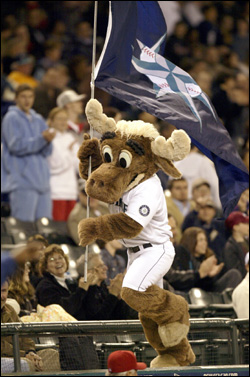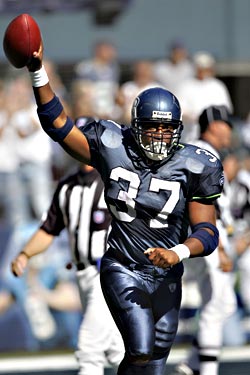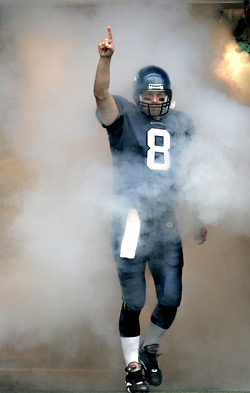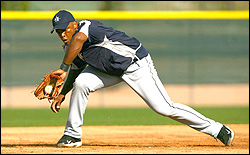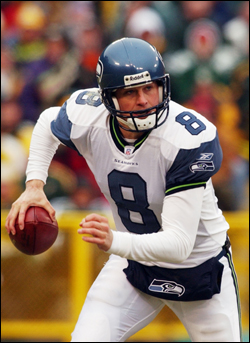Prior to Sunday’s 14-hit, crisply pitched (i.e., 2003-style) 12-2 triumph over the Detroit Tigers, some expected that a new bipartisan commission would have to be ordered to discover the reason for the Seattle Mariners’ 2004 collapse. Certain to testify would be the president (M’s team prexy Chuck Armstrong, that is), as well as the other key people (Howard Lincoln, Bill Bavasi, Bob Melvin, etc.), perhaps simultaneously. If so, the rules for such inquiries would apply: no oath, taping, or official transcript; and commission members, upon hearing joint testimony, would be rushed to Walter Reed for prefrontal lobotomies.
CEO Lincoln, General Manager Bavasi, and field boss Melvin could try to blame the ball club’s awful April and a May malaise on poor pre-baseball-war intelligence from subordinates. They might even pass blame down through the ranks, eventually posting a sign reading “The bull stops here” at the locker of the Mariner Moose. Explicators of the M’s 9-16 record (as I write this prior to the week’s home stand) might feel that the team’s brainiacs could be forgiven for not knowing how worn out most players would look during the opening month. If Jamie Moyer is really so old, they’d reason, then how come nobody calls him “James”? Team officials also could point out that the talent that was let go during the off-season isn’t exactly poised for the All-Star game. Proving he was expendable, Mike Cameron, through last weekend, was hitting about .230 for the Mets. Carlos Guillen, for the Tigers, had been flirting with a career-best batting average, but it was just a matter of time before the fragile fielder would be hobbled for a few months because of a bruised eyelash or benign fingernail tumor.
But despite playing its best game of 2004 on Sunday, the Seattle team actually is in worse shape than the record suggests. Seven of the club’s nine wins had been by a total of just 13 runs. There hasn’t been much point to the M’s getting base runners. All this does is slow down the game, since runners seldom score. Example: Ichiro taps out to short April 26 and leaves the bases loaded. Final: Orioles 3, M’s 1. Next day, when Edgar Martinez comes up in the Mariner opening inning with runners on first and second, it’s obvious he’ll hit into a double play since the M’s by then had scored just four runs this season during the first frame. Ichiro leads off with a hit against a 21-year-old pitcher last Saturday. The team’s next hit comes about two hours later (Detroit wins, 4-2). It used to take something as extraordinary as popping out near the warning track to make Rick Rizzs yodel. But in the absence of cracking bats, the M’s most ardent apologist has had to adjust. April 29, he actually rhapsodized about a Rich Aurilia walk being “a great at-bat,” leaving one to wonder what that makes Bill Mazeroski’s walk-off shot at the 1960 World Series.
Stranding so many base runners could just be a stat fluke so far. The college-level pitching could improve. Would that these were the only aspects of the 2004 disaster. Worse is the emerging reality that other clubs have gotten better while the M’s, avoiding player upgrades for so many years, have at best stagnated. Seattle lost four of six to Texas because the young Rangers are more talented this year. The Orioles and Tigers were patsies last season, but not anymore. Any honest Mariners official would admit that he’d rather have the roster of Anaheim or Oakland. After playing all of the above-mentioned competitors, the M’s have to face a winning Twins club and an awakened Yankee contingent, followed by more Baltimore and Detroit and, as May ends, the league-best Red Sox. That’s the problem when you’re 9-16: Virtually every other team you play is better than yours.
So it ain’t pretty. Seattle management, financially and emotionally, has so much invested in its personnel (manager and pitching coach included) that it’s difficult to see how benching unproductive players in favor of minor-league prospects would be considered. A few probable stars of tomorrow (two words: Jose Lopez) are in Tacoma and San Antonio, but do you really sit your established guys? Not likely.
High-level roster decisions were made for whatever reasons, and now all who care (team management, players, fans) are stuck with them. M’s brass had their chance to attract Vladimir Guerrero, Miguel Tejada, and/or Ivan Rodriguez. If the brains hadn’t quit on Scott Podsednik (.300 for the Brewers), they wouldn’t have needed Raul Ibanez (himself a costly rehire after the M’s let him leave four years ago). Mike Blowers, the astute radio commentator and former player, observed the other day that there’s zero likelihood of major trades prior to midseason. By then, however, the M’s won’t need to swap, because, at the present pace, they’ll be 23 games out of contention.
